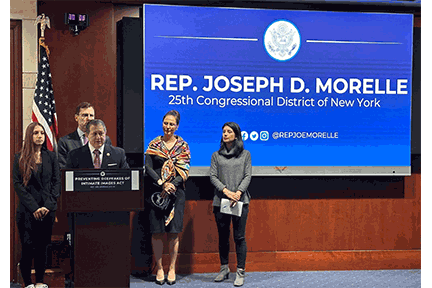Washington, DC — Congressman Joe Morelle announced he has authored bipartisan legislation to stop the spread of deepfake pornography generated by artificial intelligence (AI)—HR 3106, the Preventing Deepfakes of Intimate Images Act.
He was joined Dorota and Francesca Mani who are working to pass HR 3106 after their difficulty finding help when Francesca and her classmates were the target of deepfakes at a New Jersey High School.
“Try to imagine the horror of receiving intimate images looking exactly like you—or your daughter, or your wife, or your sister—and you can’t prove it’s not,” said Rep. Joe Morelle (D-NY). “Deepfake pornography is sexual exploitation, it’s abusive, and I’m astounded it is not already a federal crime. My legislation will finally make this dangerous practice illegal and hold perpetrators accountable. I’m grateful we have a generation of young women like Francesca ready to stand up against systemic oppression and stand in their power.”
Deepfake pornography makes up 96 percent of all deepfakes, and they almost exclusively target women. While the images are fake, their impacts are very real—and until now, there has been no federal effort to provide protection or recourse from this disturbing trend.
“Just because I’m a teenager doesn’t mean my voice isn’t powerful,” said Francesca Mani of Westfield, NJ. “Staying silent? Not an option. We are given voices to challenge, to speak up against the injustices we face. What happened to me and my classmates was not cool, and there’s no way I’m just going to shrug and let it slide. I’m here, standing up and shouting for change, fighting for laws so no one else has to feel as lost and powerless as I did on October 20th. Our voices are our secret weapon, and our words are like power-ups in a Fortnite. My mom and I are advocating to create a world where being safe isn’t just a hope; it’s a reality for everyone.”
“The use of AI by some high school students to manipulate the image of my daughter, no matter how uninformed or innocently intended, is unacceptable,” said Dorota Mani. “This incident offers a tremendous opportunity for Congress to demonstrate that it can act and act quickly, in a non-partisan matter, to protect students and young people from unnecessary exploitation.”
“As a father, I am deeply disturbed by how effortlessly this kind of technology can be used in an explicit nature and minors can easily be the victims,” said Rep. Tom Kean (R-NJ). “We live in a highly advanced technological world that is ever-changing and proper oversight is necessary. Addressing AI is a bipartisan issue, and I am proud to cosponsor Rep. Morelle’s bill to help ensure that we are doing everything we can to stop nonconsensual deepfakes online and that there are legal repercussions for those bad actors. Proper guardrails and transparency are essential for fostering a sense of responsibility among AI companies and individuals using AI. I applaud Francesca’s courage for speaking up against this issue and advocating for change to protect others from the potential harm caused by this powerful technology.”
“As a mother of four school-aged children, I am horrified to see how artificial intelligence was weaponized to bully and humiliate students at Westfield High School. Today, I am standing in support of the Mani family by demanding federal action to ensure that this type of attack doesn’t affect any more of our nation’s children,” said Rep. Mikie Sherrill (D-NJ). “This critical legislation will prohibit the non-consensual sharing of altered intimate images online and create additional legal courses of action for those whose rights were violated. I commend my friend Rep. Morelle for his leadership on this pressing issue – we will work tirelessly together to push Congress to prevent AI from being maliciously used to harm children and families.”
“So-called “deepfake” technology has made it possible for people to create and distribute customized, realistic, sexually explicit imagery of anyone without their consent– celebrities, politicians, work colleagues, ex-girlfriends, next-door neighbors, children,” said Dr. Mary Anne Franks, President of the Cyber Civil Rights Initiative at George Washington Law School. “Like other forms of image-based sexual abuse, deepfake porn disproportionately affects women and girls and causes irreparable harm, threatening victims’ mental health, physical safety, freedom of expression, and life opportunities. For women and girls, the AI crisis is not around the corner – it is already here.”
HR 3106, the Preventing Deepfakes of Intimate Images Act will prohibit the non-consensual disclosure of digitally altered intimate images. The legislation both makes the sharing of these images a criminal offense and creates a right of private action for victims to seek relief—serving as a powerful deterrent.
“Women are facing a very real danger in our increasingly digital world,” continued Rep. Morelle. “Let’s not wait for the next mass incident to make the news. This is happening every day to women everywhere, and it’s time to give them back their power.”
Related
- Jan 4 – Artificial Intelligence Technology Bills Introduced
- Aug 15, 2023 – Legislature Adopts Sen. Dodd’s Groundbreaking AI Resolution

